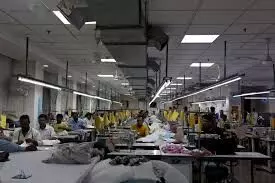US Tariffs Threaten 3 Lakh Jobs in Textiles and Gems; Experts Divided on Impact
US tariffs on Indian exports have sparked fears of up to 3 lakh job losses, with textiles and gems most at risk. While some experts warn of major disruptions, others highlight domestic demand and trade diversification as buffers.
Workers in India’s textile and gems industries face uncertainty as US tariffs threaten lakhs of jobs.

The recent US tariffs on Indian exports have triggered alarm across multiple sectors, with experts warning that nearly 3 lakh jobs could be at risk if trade restrictions persist. Industries most vulnerable include textiles, gems & jewellery, auto components, agriculture, and MSMEs, while sectors like pharma and electronics remain largely unaffected for now.
Job Loss Concerns in Labour-Intensive Sectors
According to R.P. Yadav, Founder & CMD of Genius HRTech, the textiles sector alone could see losses of nearly 1 lakh jobs if the tariffs continue beyond six months. Gems and jewellery hubs such as Surat and Mumbai’s SEEPZ are also under pressure, facing shrinking demand and rising costs in the US market. MSMEs, which dominate export-linked industries, are expected to bear the brunt.
Optimism from Domestic Demand & Diversification
On the other hand, Balasubramanian Anantha Narayanan, SVP at TeamLease Services, downplayed the broader risks. He pointed out that India’s exports to the US—worth $87 billion, just 2.2% of GDP—limit exposure. He also noted that sectors serving domestic demand remain resilient. With the recently signed FTA with the UK, experts believe India could redirect exports to other markets, softening the impact of US tariffs.
Industry-Wide Ripples and Cost-Cutting Measures
Still, concerns extend beyond textiles and gems. Aditya Mishra, CEO of CIEL HR, warned that exporters in electronics, auto components, footwear, leather, shrimp, and engineering goods face uncertainty. Even non-tariff-hit sectors like pharma are feeling ripple effects due to higher costs of upstream chemicals.
Companies have already begun freezing hiring, cutting discretionary spending, streamlining production, and reducing contract roles, which could disproportionately affect shop-floor workers, artisans, logistics staff, and MSMEs.
Spillover Risks for IT & Global Capability Centres
Mishra further highlighted risks for IT services and Global Capability Centres (GCCs). With IT hiring already slowing, prolonged tariff tensions could delay recovery and reduce India’s share in the US market.
Outlook
While optimists point to domestic demand and trade diversification as safety nets, immediate risks remain high for export-driven sectors. Until trade negotiations yield results, India’s textiles and gems industries face a period of uncertainty, with lakhs of livelihoods hanging in the balance.

